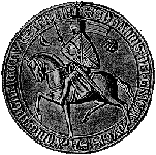Johann I (Saxony-Lauenburg)
Johann I, Duke of Saxony (* 1249 ; † July 30, 1285 in Wittenberg ) was a German sovereign from the Ascanian dynasty .
Life
The son of Duke Albrecht I of Saxony to his third wife Helena, a daughter of Duke Otto's child of Braunschweig, was born in 1249 , as is clear from a document from Archbishop Konrad II of Magdeburg . So he was only twelve years old when his father died († 1261). Although this is nowhere expressly reported, his mother seems to have been the guardian of him and his brother Albrecht II until the young dukes came of age. In 1263 Helena still documents with the consent of her sons, in 1268 the latter issue a certificate independently. Together the brothers Vogt von Lübeck and Johann therefore supported the efforts of the city.
At first they seem to have run the government jointly until they later decided to divide the paternal inheritance. When this took place is not certain: In 1272 they still bear the common seal on which they both appear next to each other. In the subsequent division of the estate, Johann received those areas of the old duchy of Saxony , which had been shattered by Henry the Lion's fall , which the Ascanian house had maintained in the storms of the time on the lower Elbe . The main venue of this area was once on the River Elbe, from the grandfather of John, Duke Bernhard of Saxony , built festivals Lauenburg so called, after the division of the Duchy of Saxony of his sons (1296) the newly created Duchy after their name was ( Sachsen-Lauenburg ). So Johann became the founder of the Lauenburg line of the Ascanian dukes of Saxony. Also Aken on the middle Elbe, where in 1270 he was a collegiate founded seems to have fallen out of his father's inheritance. Other things remained common to the two brothers. In connection with his brother in 1269 from the archbishopric of Magdeburg the burgrave office there and since then has added his title to that of burgrave of Magdeburg.
In return, the dukes gave Archbishop Belzig , Ranis and Wittenberg fiefdoms. In 1276 they also left the cities of Staßfurt and Aken , Gloworp Castle near the latter and the bailiffs over Richow and over to Archbishop Konrad II, with whom they had concluded an alliance against the Margraves of Brandenburg in 1272, in return for assuming their debts Divine grace monasteries near Calbe and Neuwerk in front of Halle . In all probability, Johann was present when Rudolf von Habsburg was elected King of Germany: at least we find him four weeks later with Rudolf, when he received the crown of Charlemagne in Aachen . Either on that occasion he exercised his right to vote in community with his brother or as a representative of the oldest branch of the Dukes of Saxony - later, as is well known, the right to cure between the two lines of Saxony-Lauenburg and Saxony-Wittenberg was the subject of bitter strife for a long time been.
As early as 1282 he ceded his lordly rights to his three sons, who initially shared the title “Duke of Saxony” with their uncle Albrecht . Nevertheless, he remained active with the special property acquired in 1282 in the northern Albing lands. In 1283 he was elected judge and captain for ten years by the princes, knights and estates in Rostock . Its task was to guarantee the protection of the peace and to represent the established union. In this function he tried to cut off English contact with Norway .
Johann retired to Wittenberg and entered the Franciscan monastery there, of which he became the guardian . He died on July 30, 1285.
progeny
His wife Ingeburg († 1302), a sister of Duke Erik Birgersson in Sweden (son of Birger Jarl ), gave birth to four daughters and four sons. Are known:
- Johann II. († 1322)
- Albrecht III. († 1308)
- Erich I. († 1359)
- Elisabeth ⚭ 1287 Duke Waldemar IV of Schleswig († 1312) ( House Estridsson )
- Helene ⚭ 1297 Count Adolf VI. of Holstein-Schauenburg (1256-1315)
literature
- Otto von Heinemann: Johann I. von Sachsen-Lauenburg . In: Allgemeine Deutsche Biographie (ADB). Volume 14, Duncker & Humblot, Leipzig 1881, p. 322.
- Wilhelm Koppe: Johann I. von Sachsen-Lauenburg. In: New German Biography (NDB). Volume 10, Duncker & Humblot, Berlin 1974, ISBN 3-428-00191-5 , p. 532 ( digitized version ).
- Georg Hirschfeld: History of the Saxon-Askanischen electors . Julius Sittenfeld, Berlin 1884
| personal data | |
|---|---|
| SURNAME | Johann I. |
| ALTERNATIVE NAMES | Johann I, Duke of Saxony |
| BRIEF DESCRIPTION | Duke of Saxe-Lauenburg |
| DATE OF BIRTH | 1249 |
| DATE OF DEATH | July 30, 1285 |
| Place of death | Wittenberg |
